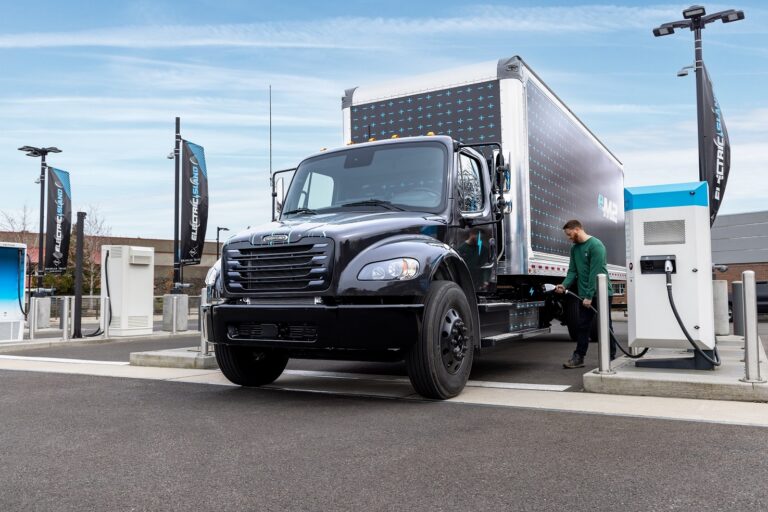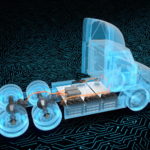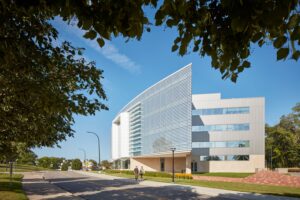
- Kim Kisner
- Business
- 12/19/2023
ePowertrain, Reuse, Recycling Are Among Green Strategies

Daimler Truck’s Detroit® Manufacturing Plant produces 400 engines, 250 transmissions, and 1,300 axles daily. The 85-year-old factory is known for making diesel engines but is now working to be a leader in the transition to sustainable transportation.
SBN Detroit interviewed Apoorva Mathur, remanufacturing – “reman” – electric product strategy analyst for Daimler Truck North America about the remanufacturing, reuse, and recycling side of the business.

Q: How do you approach electrification?
A: Our goal is to provide the ePowertrain solution that leads the transition to sustainable transportation. Everything we do pushes toward promoting sustainable transportation.
Q: In your role, you focus on the sustainability of Battery Electric Vehicle (BEV) Powertrain components through remanufacturing, reuse, and recycling. How does this work?
A: Clearly, part of leading the transition to sustainable transportation is providing an option that has zero emissions, but from an aftermarket perspective, it’s important to be conscious about what we do with components once they come out of the truck. We work to reuse as many components as possible through the remanufacturing process so that we are recycling what we already have.
A battery has a lifecycle that extends way beyond what is usable in a vehicle, so to use that battery responsibly it has to have secondary applications.
Many times, batteries that come out of a vehicle are used for peak shaving. Peak shaving is utilizing a battery storage system during peak energy usage hours to offset the amount of energy being pulled from the main grid. This reduces the load on the grid.
Used batteries can also be used in a microgrid solution whereby some kind of solar or wind-powered system is connected to a battery storage system and energy from solar is used to power the batteries. This is a self-contained situation that does not rely on the grid system at all.
Companies can also build used batteries into chargers to provide backup power.
So, there are different ways batteries and components can be remanufactured and reused.
The recycling component is pretty straightforward. We have a recycling program and a company that disposes of batteries and materials responsibly and also recycles material back into the supply chain.
Q: In your role, you also support special projects that advance battery electric vehicle (BEV) adoption, such as creating a charging hub at your Redford location. Can you tell us more about that?
A: Yes. The state of Michigan secured $13 million in funding in partnership with Daimler Truck North America and DTE Energy to develop the mobility charging hub earlier this year.
We will build a multimodal charging hub there, helping companies to transition their fleets. The charging hub will support heavy trucks and also passenger vehicles and more with the intent to help the entire community transition to EVs.
Q: What is driving your change to electrification?
A: The largest driver is a combination of emissions standards becoming stricter and also a greater focus on sustainability as a whole on the global stage. Daimler Truck is committed to the Paris Agreement globally, and we are doing our part to provide our customers with zero-emission options.
Daimler Truck as a whole is looking for what best suits our customers’ needs, and we are electrifying products across the board and will continue to go down that path.
We are also looking at other options such as hydrogen. We need to explore everything to ensure we are giving the best options to our customers.
Q: What drives your passion for what you do?

A: This is so new for all of us. I’m constantly learning. We are faced with something new every day when comes to requirements from a regulatory perspective and we are constantly getting customer feedback.
It’s unchartered territory for all of us and we are all taking this learning journey together in this industry.
That’s fun for me. It’s not the business as usual that Detroit Diesel has been doing for 85 years. It’s new and different and exciting.
Q: What are the biggest challenges?
A: Again, it’s unscripted. It involves so much effort as an industry to make this switch. We can build the product, but we also need the infrastructure. There are gas stations on every corner but supporting EVs is brand new. Also, we need support from utilities. Grid support requires more resiliency as we switch, and there is a lot of work to be done here.
When we say we are transforming the transportation industry we mean it. We are taking every component and turning it into something different and it requires so much from everyone.
Q: What are the opportunities?
A: We’ve seen a whole new level of energy and innovation coming from all sides. New suppliers and players coming into the space every day. It’s exciting to see these companies coming into the industry to push and innovate.
On the infrastructure side, it’s the same. New data companies are looking at how to use power in areas to help the grid. There are new charging management systems, new charging suppliers, etc.
It’s given the industry a chance to innovate and go outside the norm of what we provide.
Q: How do you think the work you are doing impacts Southeast Michigan in terms of innovation?
A: Detroit is the place to be when it comes to sustainable transportation. And Detroit is the hub for all things mobility.
The Battery Show North America is in Detroit each year, and there is so much knowledge at that show. It’s all being done here. Detroit is the center of competency. It’s a great place to learn and innovate and partner and work within.
Q: What does the future look like?
A: We will see change on the roads around us. Electric cars are growing in production and adoption in this area.
We will see different types of technology being used for different applications as we learn what’s effective. We will see a mixed mobility strategy across the board and that’s exciting.
I also work with students doing recruiting for Daimler Truck and also mentor at my alma mater Penn State. Students are so excited about pushing for a more sustainable environment, and they want to be involved in all of it.
Be sure to subscribe to our newsletter for regular updates on sustainable business practices in and around Detroit.
Kim Kisner
- All
- Business
- Community
- Education
- Events

The Chip Bag Project, based in Detroit, is a sustainability initiative that upcycles hard-to-recycle snack packaging — particularly chip bags — into insulated sleeping bags for individuals experiencing homelessness. Founded by Eradajere Oleita, the project addresses both environmental waste and housing insecurity by transforming materials like Mylar into practical, thermally efficient solutions. In June, Oleita was among Trelllis’s 30 Under 30, its annual recognition of the brightest young...

PowerPanel, headquartered in Oxford, focuses on sustainable energy technology with a particular emphasis on hot water systems and thermal energy capture. The company designs and manufactures modular solar hybrid systems that integrate both photovoltaic and thermal components into a single unit. Its goal is to offer energy solutions that are more efficient, durable, and economically viable for a range of commercial and industrial applications. SBN Detroit interviewed Garth...

The Detroit VA Healthcare System is implementing a systemwide sustainability strategy through its Green Environmental Management System (GEMS), designed to reduce waste, lower energy consumption, and improve operational efficiency. The program recently earned Practice Greenhealth’s “Top 25 Environmental Excellence Award.” Through coordinated efforts across departments and a commitment to innovation—particularly in high-resource areas like dialysis—the Detroit VA works to demonstrate how environmental stewardship and clinical care can go...







